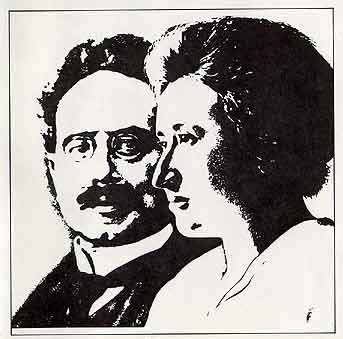Today is the 113th anniversary of the death of Wilhelm Liebknecht, founder of the SPD. Here is what the “Great Soviet Encyclopedia of 1979” said about him:
Born Mar. 29, 1826, in Giessen; died Aug. 7, 1900, in Berlin. A prominent figure in the German democratic and labor movement, a disciple and comrade of K. Marx and F. Engels. One of the founders and leaders of the German Social Democratic Party. The son of an official.
Liebknecht was educated in the universities of Berlin, Giessen, and Marburg. He was active in the Revolution of 1848–49 in Germany. After the revolution was defeated he emigrated first to Switzerland and then to Great Britain. During his emigration he became acquainted with Marx and Engels. Under their influence he adopted the ideas of scientific communism. In 1850 he joined the Union of Communists. The proclamation of an amnesty permitted Liebknecht to return to Prussia in 1862. He worked as a correspondent for various democratically oriented German and foreign newspapers. He was involved with the General German Workers’ Association and helped form the opposition to Lassallean leadership within the association. Liebknecht was one of the most ardent propagandists of the revolutionary ideas of the First International. He helped attract German workers to its ranks. In April 1865, Liebknecht was expelled from Berlin and traveled to Leipzig in Saxony, where together with A. Bebel he was active in workers’ societies. In January 1868 he was appointed editor of Demokratisches Wochenblatt, which in December 1868 became the newspaper of the Union of German Workers’ Societies. He worked in close contact with Bebel.
“Bebel,” wrote V. I. Lenin, “found in Liebknecht just what he wanted—living contact with the great work done by Marx in 1848, contact with the party formed at that time, which, though small, was genuinely proletarian, a living representative of Marxist views and Marxist traditions” (Poln. sobr. soch., 5th ed., vol. 23, p. 365). Counterbalancing the leaders of the Lassalleans, Liebknecht and Bebel criticized the policies of O. Bismarck, who had carried out the unification of Germany by counterrevolutionary means under the aegis of the Prussian Junkers. Striving to unify the country on a democratic basis, Liebknecht tolerated certain mistakes (assuming that the creation of an independent workers’ party was premature, he allied with the South German petit bourgeois democrats, who were calling for a policy of federalism). Liebknecht’s democratic illusions were sharply criticized by Marx and Engels, with whom Liebknecht was in constant communication. In 1868 at the Nuremberg Congress of Workers’ Societies, Liebknecht and Bebel broke organizationally with the bourgeois democratic currents and in 1869 founded in Eisenach the Social Democratic Workers’ Party, which was governed by the revolutionary principles of the First International. Liebknecht was the editor of the central party newspaper, Volksstaat, published in Leipzig.
Liebknecht was a deputy to the North German Reichstag from 1867 to 1870 and to the German Reichstag beginning in 1874 (with interruptions). Following the instructions of Marx and Engels, Liebknecht skillfully used the parliamentary platform to denounce the reactionary foreign and domestic policies of the Prussian Junkers and to attack militarism. During the Franco-Prussian War of 1870–71, Liebknecht and Bebel, taking an internationalist position, opposed the annexationist plans of the Junkers and bourgeoisie. He passionately propagandized the idea of solidarity with the Paris Commune of 1871. For their opposition to Germany’s annexation of Alsace and East Lorraine, Liebknecht and Bebel were brought to trial in 1872 by Bismarck’s government, accused of “state treason,” and sentenced to two years’ imprisonment. “We congratulate all of you for your speech in court,” Engels wrote to Liebknecht on Apr. 23, 1872, referring to the bold appeal of the accused to the German and international workers’ movement (Marx and Engels, Soch., 2nd ed., vol. 33, p. 378).
Liebknecht was instrumental in helping the Eisenachians and Lassalleans come together in 1875. However, in doing this he made considerable concessions to the Lassalleans on questions of principle involving both theory and the party program. The program adopted at the Gotha Social Democratic Unity Congress, which had been principally devised by Liebknecht, was sharply criticized by Marx and Engels. Under the impact of criticism from Marx and Engels, Liebknecht adopted revolutionary positions at decisive moments of the class struggle. During the period when the discriminatory law against socialists was in force (1878–90), Liebknecht was one of the militant leaders of the illegal party. In 1890 he became editor in chief of Vorwärts, the central organ of the Social Democratic Party. He played an active part in disseminating Marxist teachings in Germany.
He was repeatedly imprisoned for revolutionary activities. Liebknecht was one of the organizers of the Second International and a participant in its congresses. He actively opposed militarism.






